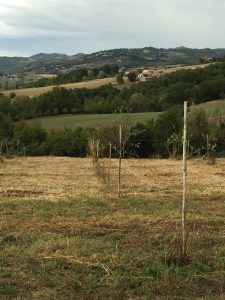Dispatches From Civitella Ranieri: On Having Time to Work

As part of a special collaboration between PEN America and the Civitella Ranieri Foundation in Umbria, Italy, every two years PEN America provides a unique, six-week residency to a working PEN America Member. A special panel of judges awarded the inaugural residency to poet Natalie Diaz. This year’s fellow is Sameer Pandya, author of The Blind Writer: Stories and a Novella, which was longlisted for the 2016 PEN Open Book Award.
This week, Pandya, returned from his residency, reflects on the ways time can shape one’s creative work.
Postscript: On Having Time to Work
I am back in California, doing all the things—waking up very early to write, making five-minute eggs for my kids, teaching classes, grocery shopping, cooking—that I was away from during my six-week residency in Italy. And now, looking back on those magical weeks where I could wake up and fall asleep, thinking only about the pages I was working on, I have been reflecting on the different ways time can shape creative work.
A few days ago, I drove by a new, large house being built on what had been an empty lot. Out front, the owners had planted five enormous, fully formed olive trees. The trees must have been transplanted from somewhere else, giving the front yard the look of a mature garden, where it had been a large dusty patch merely days before. This felt like a quintessential, dark California transformation.
I am resistant to leaning too heavily on nature and natural symbols because it can feel heavy-handed. Sometimes, a tree is just a tree. And yet, the sight of this instant mature yard reminded me of some other, smaller trees.
On the walks I took in the rolling hills outside the Civitella castle, I came upon many old olive trees, decades and perhaps centuries in the forming. But then, several weeks into my stay, I walked by a field with brand new plantings. I was sure that I had seen a sad, anemic grape orchard there before, but this time, there were rows and rows of single olive trunks, each no thicker than a few inches in diameter. In this era of instant everything, it was an arresting sight. Someone had planted these olives, thinking that 10, 20 years later, they would begin to give fruit and shade.
Over six weeks, with the benefit of time, I experienced the normal, exhausting emotions that accompany writing: doubt and the fear of failure. And at the same time, I felt the exhilaration of a line that worked, of a chapter that felt complete. It is really hard to know what of the single, thin trunks will grow into one of the older trees, and what will remain a little stunted, until at some point, a paragraph here, or an entire chapter there, ends up as a branch on an entirely different tree. What is clear is that no good work happens overnight.
I don’t have the benefit of long days of work anymore, but having the good fortune to have had them, working in stretches of a few hours here and several hours there feels far more effective. In a time when the work of imagination feels as vitally important as it ever has, when light needs to come in, when stories that don’t usually get narrated need to, time feels like such a commodity.






